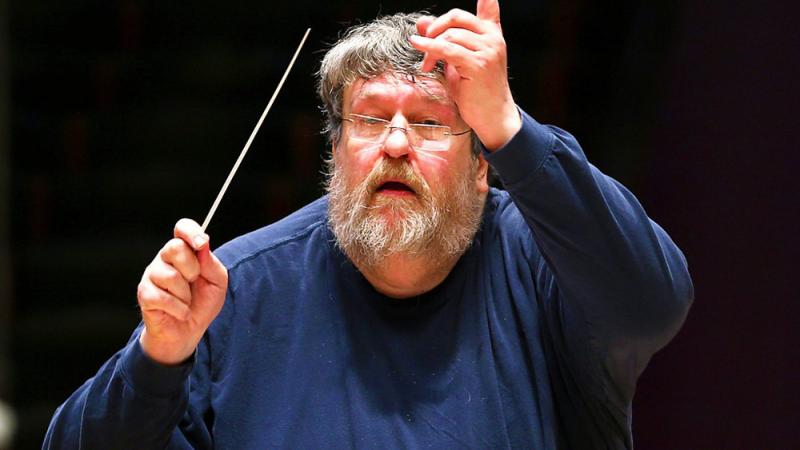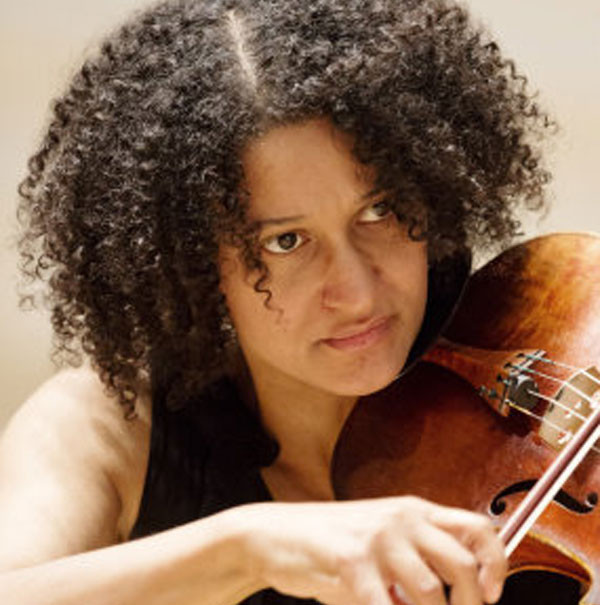Atkins, SCO, Knussen, Queen's Hall, Edinburgh | reviews, news & interviews
Atkins, SCO, Knussen, Queen's Hall, Edinburgh
Atkins, SCO, Knussen, Queen's Hall, Edinburgh
A baffling ending to an extrovert evening of (mostly) music since 1945

Edinburgh audiences can, it has to be said, be frustratingly unadventurous. Which no doubt accounts for the relatively light turnout for the Scottish Chamber Orchestra’s quietly fizzing Queen’s Hall concert under conductor Oliver Knussen, three quarters of whose music was written after 1945. What any absentees missed, however, was a gloriously passionate evening of crisp, energetic music making.
Knussen’s opener – hardly a crowd-pleaser, admittedly – was Hans Werner Henze’s brief First Symphony, but it also proved the evening’s real discovery, a very early work from just two years after the end of the Second World War, when Henze was coming to terms with his experiences fighting for the German army. It’s a bewilderingly bright and breezy piece for those times, kind of Tippett meets neo-classical Stravinsky, and it felt just right for Knussen and the SCO – graceful, elegant, with a kind of clockwork precision that also marks out Knussen’s own music, and which also played to the exquisite craftsmanship of his conducting. It felt, too, like a constant struggle to suppress the music’s increasingly assertive dark, violent elements, which burst to the surface in its final movement, but Knussen charted its journey from blithe cheeriness to torment and disintegration with sincerity, and without undue sentimentality.
Glasgow-born Martin Suckling is the SCO’s composer in association, and the Orchestra boldly commissioned his set of miniatures Six Speechless Songs for its 40th anniversary concert in 2014. It was good to re-hear the work on its own terms outside the pomp of that event – and good, too, that this likeable, provocative piece was getting a repeat performance so soon after its high-profile premiere. And like Henze’s, it feels in Suckling’s music that every note counts and has its rightful place, something Knussen’s incisive direction served to highlight. It’s exquisitely orchestrated – from chattering, Messiaen-like birdsong in the opener, to the mournful bells tolling across the orchestra in the fourth piece, to the shrill piping of two piccolos that closes the work – for a relatively small band, and covers a remarkable range of moods and emotions, intimate and engaging. Knussen’s account felt more sparkling and extrovert than Robin Ticciati’s careful craftsmanship at the premiere performance, but no less vividly detailed.
 SCO principal violist Jane Atkins (pictured right) had been in her usual seat at the front of the violas before the interval – and indeed stepped back into it, to a ripple of applause, for the concert’s final number – but stood out front as soloist just after the break for Britten’s Lachrymae. And though her playing was distinctive and demonstrative, she felt, too, like first among equals, sharing the limelight with the SCO strings in an appropriately melancholy account that felt like a study in greys, supple with rubato and shaped thoughtfully.
SCO principal violist Jane Atkins (pictured right) had been in her usual seat at the front of the violas before the interval – and indeed stepped back into it, to a ripple of applause, for the concert’s final number – but stood out front as soloist just after the break for Britten’s Lachrymae. And though her playing was distinctive and demonstrative, she felt, too, like first among equals, sharing the limelight with the SCO strings in an appropriately melancholy account that felt like a study in greys, supple with rubato and shaped thoughtfully.
Knussen’s closing number, however, brought the concert to a slightly baffling end. There was no lack of bite, energy or vigour in his account of Mendelssohn’s teenage First Symphony – from his wonderfully overblown Sturm und Drang of the opening movement to a nimble, spirited finale – but ultimately, it all felt rather lightweight. Perhaps some light relief after the more demanding music earlier on, or there to reassure concert-goers nervous of all this modernism – or, maybe, simply a bit of a missed opportunity.
rating
Explore topics
Share this article
The future of Arts Journalism
You can stop theartsdesk.com closing!
We urgently need financing to survive. Our fundraising drive has thus far raised £33,000 but we need to reach £100,000 or we will be forced to close. Please contribute here: https://gofund.me/c3f6033d
And if you can forward this information to anyone who might assist, we’d be grateful.

Subscribe to theartsdesk.com
Thank you for continuing to read our work on theartsdesk.com. For unlimited access to every article in its entirety, including our archive of more than 15,000 pieces, we're asking for £5 per month or £40 per year. We feel it's a very good deal, and hope you do too.
To take a subscription now simply click here.
And if you're looking for that extra gift for a friend or family member, why not treat them to a theartsdesk.com gift subscription?
more Classical music
 Levit, Sternath, Wigmore Hall review - pushing the boundaries in Prokofiev and Shostakovich
Master pianist shines the spotlight on star protégé in another unique programme
Levit, Sternath, Wigmore Hall review - pushing the boundaries in Prokofiev and Shostakovich
Master pianist shines the spotlight on star protégé in another unique programme
 Classical CDs: Big bands, beasts and birdcalls
Italian songs, Viennese chamber music and an enterprising guitar quartet
Classical CDs: Big bands, beasts and birdcalls
Italian songs, Viennese chamber music and an enterprising guitar quartet
 Connolly, BBC Philharmonic, Paterson, Bridgewater Hall, Manchester review - a journey through French splendours
Magic in lesser-known works of Duruflé and Chausson
Connolly, BBC Philharmonic, Paterson, Bridgewater Hall, Manchester review - a journey through French splendours
Magic in lesser-known works of Duruflé and Chausson
 Biss, National Symphony Orchestra, Kuokman, NCH Dublin review - full house goes wild for vivid epics
Passionate and precise playing of Brahms and Berlioz under a dancing master
Biss, National Symphony Orchestra, Kuokman, NCH Dublin review - full house goes wild for vivid epics
Passionate and precise playing of Brahms and Berlioz under a dancing master
 Verdi Requiem, Philharmonia, Muti, RFH review - new sparks from an old flame
Discoveries on a veteran maestro's epic journey
Verdi Requiem, Philharmonia, Muti, RFH review - new sparks from an old flame
Discoveries on a veteran maestro's epic journey
 Batsashvili, Hallé, Wong, Bridgewater Hall, Manchester review - a star in the piano universe
The Georgian pianist brings precision and freedom to Liszt’s warhorses
Batsashvili, Hallé, Wong, Bridgewater Hall, Manchester review - a star in the piano universe
The Georgian pianist brings precision and freedom to Liszt’s warhorses
 Naumov, SCO, Egarr, Queen's Hall, Edinburgh review - orchestral magic rescues some punishing music
Hard-driven Beethoven, monotonous Eötvös, some light from Kernis
Naumov, SCO, Egarr, Queen's Hall, Edinburgh review - orchestral magic rescues some punishing music
Hard-driven Beethoven, monotonous Eötvös, some light from Kernis
 Classical CDs: Shipping lines, sabre dances and sea lice
Neglected piano concertos, Italian art songs and new music for trombones
Classical CDs: Shipping lines, sabre dances and sea lice
Neglected piano concertos, Italian art songs and new music for trombones
 Il trionfo del Tempo e del Disinganno, Irish Baroque Orchestra, Whelan, St George’s Hanover Square review - Handel’s journey of a soul
Pleasure gets the best deal despite Beauty’s struggle to higher things
Il trionfo del Tempo e del Disinganno, Irish Baroque Orchestra, Whelan, St George’s Hanover Square review - Handel’s journey of a soul
Pleasure gets the best deal despite Beauty’s struggle to higher things
 Uproar, Rafferty, Royal Welsh College, Cardiff review - colourful new inventions inspired by Ligeti
Unfussy professionalism from Wales-based new music ensemble
Uproar, Rafferty, Royal Welsh College, Cardiff review - colourful new inventions inspired by Ligeti
Unfussy professionalism from Wales-based new music ensemble
 Attacca Quartet, Kings Place review - bridging the centuries in sound
Grammy-winning quartet bring more American punch than Gallic je-ne-sais-quoi to Ravel
Attacca Quartet, Kings Place review - bridging the centuries in sound
Grammy-winning quartet bring more American punch than Gallic je-ne-sais-quoi to Ravel

Add comment